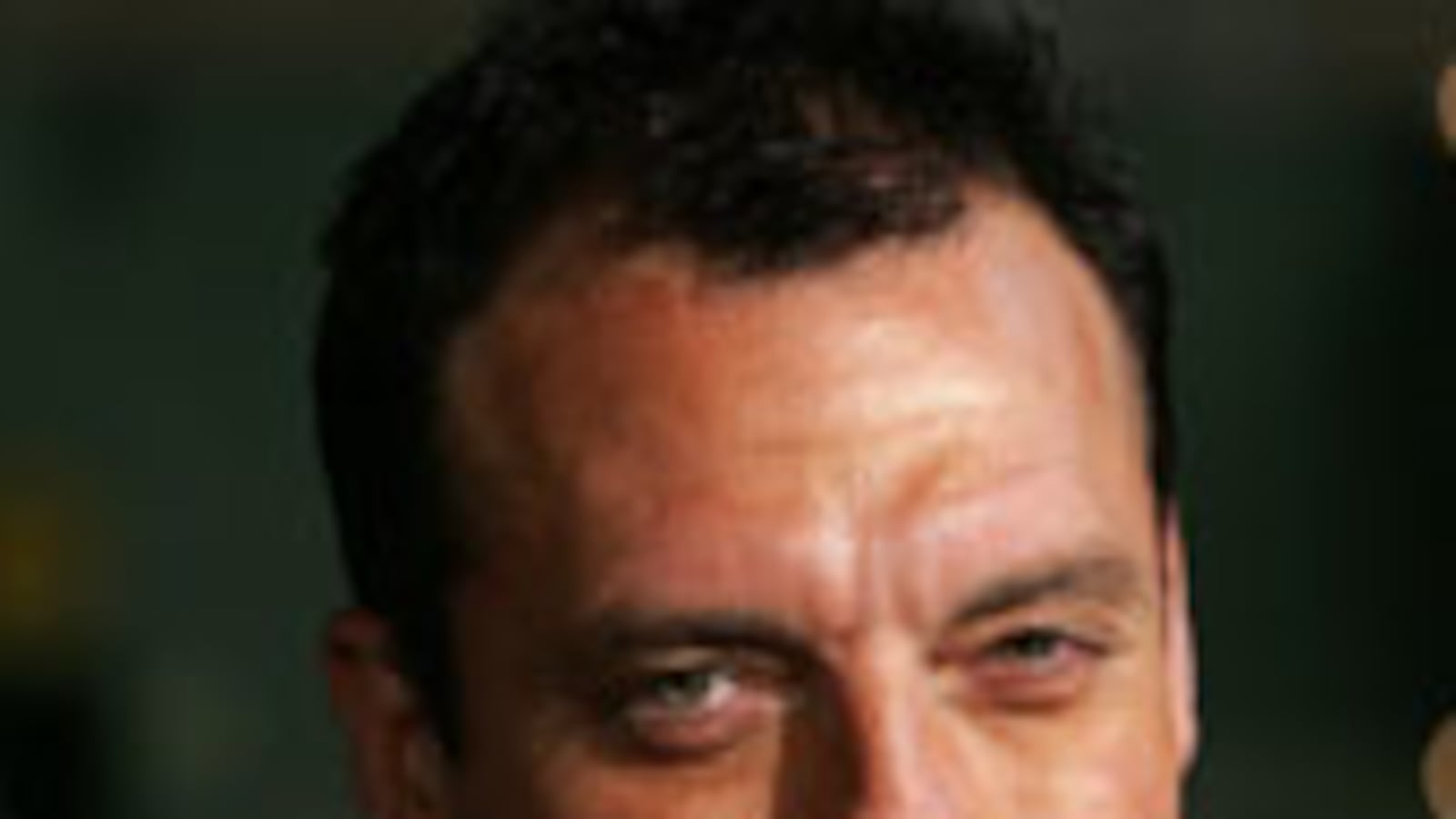
In May of last year, Tom Sizemore thought his career was over. "Bob [Forrest, from Celebrity Rehab] thought I had a future in helping people get sober, and that seemed like a good idea," he says with a wry laugh. "Because, look, I like to read, see movies, look at art, and be around people. That doesn't exactly set me up for a lot of career options."
Sizemore's concerns for his future were hardly unwarranted. The Golden Globe-nominated actor, whose heyday included meaty roles in True Romance, Natural Born Killers, Heat, and Saving Private Ryan, had slipped as far down a slippery slope as one can go: You don't, after all, spend $11 million on lawyers and legal fees for domestic-violence and drug charges if your life is going well. And if some of those charges involve the world's most famous madam, it's safe to say that you've reached a whole new depth.
“I was vaguely aware of the fact that I was on TV… I was going through terrible withdrawal and really wasn’t conscious of what was going on.”
The once-promising actor went to rehab for heroin addiction in 1998 and managed to keep it together for years afterward. But things took a turn for the worse when he met "Hollywood Madam" Heidi Fleiss in 2001 and started doing meth. She claimed he was violent with her and, in 2003, he was convicted of physical abuse and went to jail for 17 months. Several more arrests followed before he washed up on the shores of Celebrity Rehab With Dr. Drew last year.
Everyone knew he was fiercely talented. They also thought he was a lost cause. "I could feel people thinking, 'What a shame—look at what Tom Sizemore's done to his life,'" he says. When he first appeared on the show, looking shriveled and like he might dart for the nearest exit at any moment, most assumed this would be his last on-screen appearance for a while, if not ever. Hollywood, we could say with a shake of our collective heads, had tossed up yet another casualty.
But something happened to Sizemore on the third season of Dr. Drew's show. The guy who'd brandished guns in nearly all of his movies not only openly wept, but also did what was asked of him, including signing on for the show's followup, Sober House. Now 15 months sober, the 48-year-old self-proclaimed "nice boy from Detroit" has been more than making up for the lost time: His IMDB page lists over 30 projects between 2009 and 2010. Even he seems to have trouble keeping track of them all.
No one is more shocked by this turn of events than Sizemore. Though he'd tried to get sober numerous times—and succeeded from 1997 to 2002—"I never really used the tools," he says. "If I wanted to use, I didn't think, 'Well, I could call someone and try to talk about this.' I didn't do any of the internal work." After a beat he adds, "Honestly? I did it to stay married." But he and actress Maeve Quinlan divorced in 1999, something he's now able to talk about honestly. "She left me," he says later in the conversation. "I used to tell people that I left her. I was always minimizing everything." (Single today for "the first time in my life," Sizemore is father to 5-year-old twin boys; their mother is ex-girlfriend Janelle McIntire.)
Divorce isn't the only topic he's willing to come clean about now. "I used to blame my problems on other people," he confesses. "But my moment of clarity, if you want to call it that, came when I was looking in the mirror one day and just burst into tears. It wasn't just that I looked bad, it was that I knew my problem was me. I used to think it was Heidi [Fleiss] or the police trying to find some sort of scapegoat, but I could suddenly see that it was me and that it had always been me."
The difference this time isn't just that he was finally sick of the life he had—"I hadn't had fun doing drugs in at least a year and those last couple months were just horrendous"—but that the right support group was there at the right time. Sizemore has known Dr. Drew Pinsky since 2000 and Forrest since 1991; Forrest is actually his former dope dealer. "I was one of the people he called to bail him out of jail when he was arrested in '96," Sizemore says with a quick laugh. "But his friend Johnny [Depp] called me and said, 'Don't do it.' That's when Bob got sober." For years, Forrest tried to help Sizemore. "He told me in 2004 that if I did meth, I'd lose everything," Sizemore says. "I didn't believe him. I had a home, cars—all this stuff that it had taken a long time to accumulate. I thought, 'There's no way I could lose it all.' But within three years, it was gone."
Forrest wasn't the only one trying to help save Sizemore from himself. There was Pinsky. There was Sizemore's brother Paul, a Los Angeles real-estate agent who's been sober 11 years. There was even Steven Spielberg, who hired Sizemore to play Sergeant Mike Horvath in Saving Private Ryan but told him that if he tested positive for drugs, even on the last day of shooting, "he would fire me on the spot and shoot all 58 days that I'd worked over again with someone else." While this helped him, Sizemore adds with just the barest glimmer of pride, "I wouldn't need that type of threat now."
Celebrity Rehab, the show that he credits with getting him to this point, is a bit of a blur. "I was vaguely aware of the fact that I was on TV but it didn't really hit me until Sober House," he says. "I was going through terrible withdrawal [on Celebrity Rehab] and really wasn't conscious of what was going on." When he finally sat down and watched the two shows six months ago, "I had another period of grieving," he says. His voice breaks. "When I watched my first couple privates with Drew, I thought, 'The guy sitting there looks like the saddest guy that ever lived.'" He chokes back a sob and adds, "I'm grateful I have that since addicts have the propensity to forget how bad it was and I can't because it's there on tape."
Sizemore gets riled up when people deride Pinsky in any way. "I don't know what's wrong with people who say that [he's exploiting other people's problems]. He's the nicest man that's ever lived. He's paid a nominal fee for these shows. He does them to help make the world aware of the fact that alcoholism is a disease that has a cure."
Forrest is a significant part of Sizemore's sobriety—his name comes up at least 10 times during our conversation—but that doesn't mean their path together has been one of rose petals and rainbows. "I remember sitting in the back of Bob's truck 10 months ago," Sizemore recalls, "thinking, 'I hate you, I hate your hair, I hate your hat, I hate this truck, I hate going to this meeting in the middle of the day.'" He laughs but quickly turns earnest. "Now I love my sobriety." His voice breaks again. "I didn't know I could do it."
And, he says, it feels good to show people that he's not the brute thug he always acted like. "I have thin skin," he says. "I'm not a tough guy. I play tough guys in movies and behaved like one in front of the press because I thought that was what a man did." Now, the pressure to be "the cool guy" or "the drug guy" has dissipated. Most people, he says, are surprised to see what he's really like. "They can't believe I have a Master's in Fine Arts," he says with a chuckle, "and that I enjoy Shakespeare. I'm essentially a momma's boy with a good education."
What's surprising Sizemore, in turn, is the fact that so many directors want to work with him. "I wouldn't want anything to do with me," he says and yet he's just wrapped production on Cartel of Snitches, a thriller about (ironically enough) Colombian drug cartels. Soon he's jetting off to Tampa, Florida, to meet with blind people to prep for a drama called An Evening With Donald Kempinski. Sobriety, he says, has made him "facile" in his acting. "I used to be very rigid because I just wanted to get through it," he says. "Now, if I think a scene should go a certain way and it goes another, I'm able to go that new way with ease."
Sizemore's performance in White Night—a comedy about the Ku Klux Klan that comes out in January—is, according to his manager, the best of his career. Sizemore speculates that this is because of the similarities between his own journey and that of his character—Leroy Lowe, a Southern Grand Dragon of the Klan who transforms into a peace-loving hippie. Unsurprisingly at this point, Sizemore cried when he read the script, particularly the part where another character handed Lowe a note about how anyone can change. "We get second chances," Sizemore says now, sounding like he might cry again. "We get 19th chances."
Anna David is the author of the novels Party Girl and Bought and has written for The New York Times, Playboy, Details, Cosmo, and Redbook, among other publications. She appears on CBS, NBC, Fox News and many other networks regularly. Her most recent book, Reality Matters, is an anthology of essays that she edited about reality shows.






